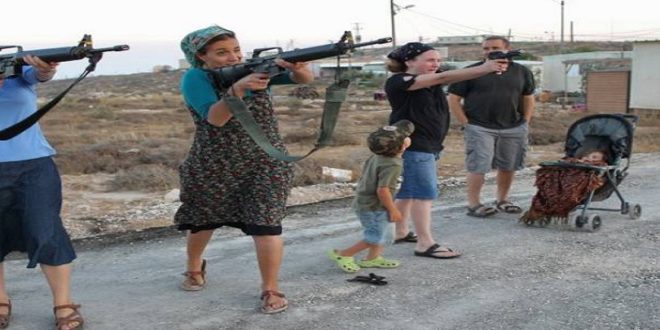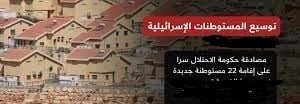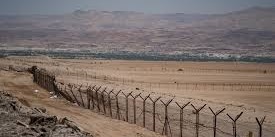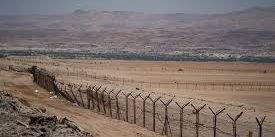By: Madeeha Araj,
International condemnation of the settlement activities in the occupied West including Jerusalem, as the Israeli Minister of Internal Security, Arad ratified the Israeli government’s reduction of the requirements for obtaining arm licenses, especially, settlers as well as allowing the young settlers belonging to terrorist hilltop and pay the price gangs organizations. There are currently some 145,000 Israelis in the 1967 occupied territories, who hold permits to carry weapons excluding soldiers, police officers and many others due to the easing of arm licensing standards, the number of settlers is expected to increase to about 200,000.
Within the context, the National Bureau demanded that the file of arming the settlers has to be sent to the International Forums, starting with the Security Council, through the International Criminal Court ICC, ending with the General Assembly to warn against the danger of those measures, and to provide urgent international protection to our people.
As for settlement, expansion in the Beit-Eil settlement near Ramallah was noticed as the Israeli government ratified the construction of 650 new housing units. The decision to expand the settlement plan has been approved by the Beit-Eil settlement council and the Ministry of Housing last week. In April 2017, the Israeli Ministry of Housing also approved the construction of two buildings on a private Palestinian land in the settlement claiming that took place by mistake, at the same time justified that to compensate settlers evacuated from the outpost of Olbana and Darinov outposts in in 2012 – 2015, thus increasing the percent of settlers by 65%.
The so-called “Civil Administration” of the Israeli occupation army also approved the establishment of hundreds of new settlement housing units on the occupied West Bank, some of them in isolated settlement, where 384 housing units were finally approved to be implemented soon. Planning has also been undertaken for other construction projects, but still needs to be approved by the Supreme Planning Council of the Civil Administration.
The plans approved for the project include the construction of 56 housing units in the Barkan settlement, 8 in Avnei Hefetz, 168 in Tsufim, 108 in Novim and 44 in “Ma’ale” Adumim, 84 in Kiryat Netafim, 29 in Etniel, 52 in Beit-Eil, besides 400 housing units in a settlement near Jerusalem.
The Committee was supposed to approve the settle two settlement outposts, but this was withdrawn from the agenda at the last minute. The first plan relates to the Haru’eh Hafri outpost near the settlement of Kfar Adumim, which was established under the auspices of the Ministry of Education, funded by the Israeli public. The other plan relates to Effi Hanahal, which includes 98 housing units in Gush Etzion settlement bloc. The “settlement council” in the occupied West Bank has approved that a small number of housing units have been approved compared with what was approved last year, adding the number of building approved by the previous committees reached between 2000 and 3000 housing units.
In the Bethlehem governorate, the Israeli occupation authorities approved the construction of 106 new settlement units in the settlement of Efrat, located on the lands of Al-Khader and Artas village, south of Bethlehem. The Supreme Planning Council of the Civil Administration of the Israeli army initially approved 40 settlement units in the settlement of Efrat, but the settlement leaders expressed their reservations and demanded an increase in the number of settlement units. Their request was led for the approval of 106 settlement units at the expense of the lands of the inhabitants of the town of Khader and the village of Artas. The Israeli occupation authorities also approved the transfer of agricultural land in the town of Al Khader, south of Bethlehem, to residential housing for settlers. Through the so-called “Civil Administration” approved the transfer of about 100 dunums of agricultural land in the area of ”Ein Kassis” west of the Greens to residential land for settlers in Daniel settlement.
In a dangerous development that suggests turning the conflict into a serious religious dimensions, the Israeli Supreme Court has asked the Israeli Minister of Internal Security, the Israeli police and several Israeli government bodies to send their explanations and arguments that prevent Jews from praying inside al-Aqsa. The Supreme Court gave the Israeli police no more than 60 days to respond to the request to reconsider the case and respond to the groups and their demands. The so-called Temple groups considered this decision of the Supreme Court as an important and advanced step in enabling Jews to pray in al-Aqsa by a decision of the Court of Justice. Some members of these extremist groups merely accepted removing the warning plate at the entrance to the Moroccan Gate’s bridge. The most radical founding member, Yehuda Glick, demanded on Sunday that a system of maximum sharing be established, as in the Ibrahimi Mosque in Hebron, which was supported by a large number of senior members of the Temple groups.
The policy of the settler government in the West Bank, including occupied Jerusalem, is widely contested at the international level. The European Union declared its rejection of the policy of expansionist settlement adopted by the Israeli occupation authorities again, in which condemned the Israeli government’s agreement to build some 1,000 new settlement units in occupied Jerusalem and to promote plans and tenders for more than 2000 housing units in the occupied West Bank and Jerusalem. The occupation of the plan and the construction of these settlement units will prevent “the possibility of a viable Palestinian state” in the future. It stressed its strong opposition to the policy of illegal settlement occupation under international law, considering that would be an obstacle in the way of peace.
The United Kingdom, for its part, has never failed to condemn Israel’s settlement activities. Secretary of State for Near Eastern Affairs, Alistair Burt has declared that Israeli settlements in the West Bank are illegal under international law, one of the obstacles to a viable two-state solution. Israel’s announcement of plans to build more than 1,000 Israeli settlement units in the West Bank and a tender last week to build more than 1,100 other units are condemned by the international community, and the United Kingdom. He also called on Israel to stop such acts, France also condemned that Spokeswoman for the Ministry of European Affairs and Foreign Affairs said the decisions, as well as, the demolitions and evictions affecting the Palestinians in Area C, especially in the “E1” region, are part of the same strategy that directly threatens the feasibility of a future Palestinian state and called for a reconsideration of such decisions and the abandonment of that colonial strategy in order to achieve the two state solution.
 المكتب الوطني للدفاع عن الارض ومقاومة الاستيطان منظمة التحرير الفلسطينية
المكتب الوطني للدفاع عن الارض ومقاومة الاستيطان منظمة التحرير الفلسطينية




